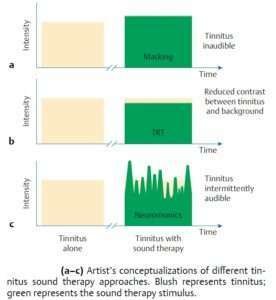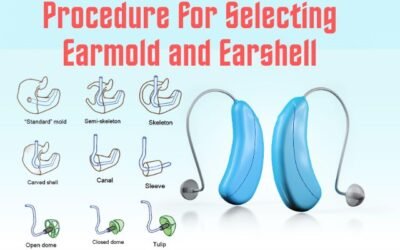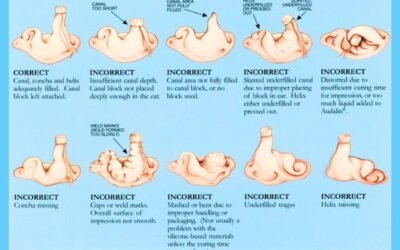Tinnitus and Medical line of Treatment: Tinnitus is the abnormal perception of sounds for which there is no external stimulus (see, e.g., Tyler, 2000 2006; Snow 2004; Henry, Dennis, & Schechter 2005). Tinnitus is typically associated with a wide variety of sensorineural and conductive hearing losses, but it also occurs when hearing is within normal limits.
Types of Tinnitus
Two types of tinnitus are described:
- Subjective Tinnitus, which can only be heard by the patient.
- Objective Tinnitus, which can even be heard by the examiner with the use of a stethoscope
Subjective tinnitus
- Subjective tinnitus may have its origin in the external ear, middle ear, inner ear, VIIIth nerve or the central nervous system.
- Systemic disorders like anaemia, arteriosclerosis, hypertension and certain drugs may act through the inner ear or central auditory pathways.
- In the presence of conductive hearing loss, the patient may hear abnormal noises in the head during eating, speaking or even respiration.
Objective tinnitus
- Objective tinnitus is seen less frequently.
- Vascular lesions, e.g. glomus tumour or carotid artery aneurysm cause swishing tinnitus synchronous with pulse.
- It can be temporarily abolished by pressure on the common carotid artery.
- Venous hum can sometimes be stopped by pressure on the neck veins.
Causes of Tinnitus
Causes of Subjective Tinnitus
- Otologic
- Impacted wax
- Fluid in middle ear
- Acute otitis media
- Chronic otitis media
- Ménière’s disease
- Presbycusis
- Noise-induced hearing loss
- Idiopathic sudden SNHL
- Acoustic neuroma
- Metabolic
- Hypothyroidism
- Hyperthyroidism
- Obesity
- Hyperlipidaemia
- Vitamin deficiency (e.g. B12)
- Neurologic
- Head injury (labyrinthine concussion)
- Temporal bone fractures
- Whiplash injury
- Multiple sclerosis
- Postmeningitic
- Brain haemorrhage
- Brain infarct
- Cardiovascular
- Hypertension
- Hypotension
- Anaemia
- Cardiac arrhythmias
- Arteriosclerosis
- Pharmacologic
- Certain drugs used by the patient
- All ototoxic drugs
- Psychogenic
- Anxiety
- Depression
Causes of Objective Tinnitus
- Vascular
- AV shunts
- Congenital AV malformations
- Glomus tumour of middle ear
- Arterial bruit
- Carotid aneurysm
- Carotid stenosis
- Vascular loop pressing on VIIIth nerve in internal auditory canal
- High-riding carotid artery
- Persistent stapedial artery
- Venous hum
- Dehiscent jugular bulb
- AV shunts
- Patulous eustachian tube
- Palatal myoclonus
- Idiopathic stapedial or tensor tympani myoclonus
- Dental
- Clicking of TM
Treatment of Tinnitus
- Tinnitus is a symptom and not a disease. Where possible, its cause should be discovered and treated. Sometimes, even the treatment of cause may not alleviate tinnitus.
- When no cause is found, management of tinnitus includes:
- Reassurance and psychotherapy: Many times the patient has to learn to live with tinnitus.
- Techniques of relaxation and biofeedback.
- Sedation and tranquillizers: They may be needed in initial stages till patient has adjusted to the symptom.
- Masking of tinnitus: Tinnitus is more annoying at bedtime when the surroundings are quite. Use of a fan, loudly clicking clock or a similar device may mask the tinnitus and help the patient to go to sleep. Use of a hearing aid, in persons with hearing loss, not only improves hearing but also provides a masking effect.
- Tinnitus maskers can be used in patients who have no hearing loss. They are worn like a hearing aid. Use of tinnitus masker for a short time may provide, in some individuals, a symptom-free period for several hours dueto the phenomenon of residual inhibition.
Tinnitus Retraining Therapy (TRT)
- Jastreboff from University of Maryland described a neurophysiologic model for generation of tinnitus and the basis for habituation therapy.
- It presumes that tinnitus does not cause as much annoyance as the emotional reactions generated from the limbic and autonomic systems.
- His therapeutic model aims to attenuate connections between auditory, limbic and autonomic nervous systems and thus create tinnitus habituation.
- It occurs at two levels:
- Habituation of reaction – It is uncoupling of brain and body from negative reactions to tinnitus.
- Habituation of tinnitus – It is blocking the tinnitus-related neuronal activity to reach level of consciousness.
- With this therapy patients suffering from tinnitus lose awareness of tinnitus and also do not get annoyed even when they do have tinnitus.

Artist’s-conceptualizations-of-different-tinnitus-sound-therapy-approach
- Therapy consists of two major components:
- Counselling: It is important to educate the patient about tinnitus, its mechanism of generations, perception of tinnitus at subcortical and cortical levels and the plasticity of brain which can habituate any sensory stimuli. Limbic system (emotions) and autonomic system (body reactions) are the primary sources of negative reactions to tinnitus, i.e. sleep disturbance, inability to concentrate, annoyance, anxiety and depression and not the tinnitus per se.
- Sound therapy: Patient is exposed to environmental sounds, music radio, television, or use of hearing aids (in case he suffers from hearing loss). In general, he should avoid silent environment. To produce external sound for habituation, sound generators are used which produce continuous low-level, broad-band noise for at least 8 h a day. Sound, here is used not for masking the tinnitus but is adjusted to remain at a low level, for habituation. TRT needs a long period of 18–24 months but gives a significant improvement in more than 80% of patients.
References:
⇒ Diseases of Ear, Nose and Throat & Head and Neck Surgery – PL Dingra (Book)
⇒ Essentials of Audiology – Stanley A. Gelfand, PhD (Book)
You are reading about:
Tinnitus and Medical line of Treatment





0 Comments